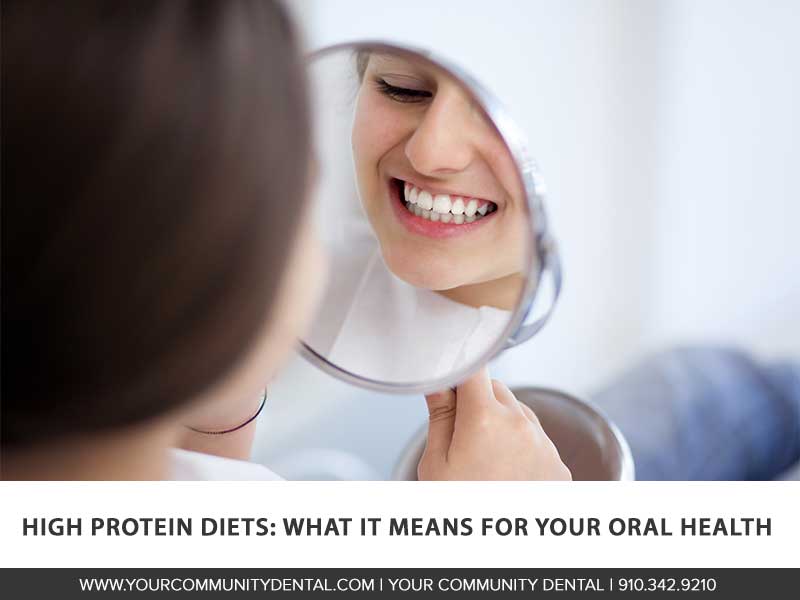
Your Community Dental Looks at What High-Protein Diets are Doing to Your Teeth
Thinking about your summer body and looking at the possibility of a high-protein, low-carb diet as a strategy to get you that physique back? You might want to think twice, or at least plan to be moderate about your enthusiasm for such a diet! High protein consumption can have negative impacts on your oral health.
Did you know that protein promotes acid-production in your saliva? The more protein you eat, the more your saliva will fill up with acid in order to help with the digestion of the protein—that’s just biology. What’s also biology is the chemicals that protein contains, ones that can harm your teeth. High-protein foods contain sulfur and phosphorous, which turn into sulfuric and phosphoric acids as your body digests the protein. So, get this: your body makes acid to digest the proteins you eat and the foods you eat with acidic components in them, already. That’s a lot of acid!
Too much acid in your saliva and mouth will de-mineralize your teeth. The acids eat away at the minerals and enamel of your teeth, exposing them to various kinds of harmful bacteria that can cause tooth decay and loss, cavities, or periodontal disease (which affects your gum tissues). Sugar and other simple carbs can also put your mouth in danger of such oral health problems. But people know that sugar does this—the American Dental Association has helped America see that problem. What Americans tend to forget is that protein can be a culprit too!
Did you know that the recommended protein consumption for men is 63 grams of protein, and for women it is 50 grams in a day? Yet most of us eat far more than that in a given day. So, when you purposely up the level of your protein intake, you also are further increasing risks to your teeth. Such diets might trim your waistline but just be aware that they can also trim your tooth enamel.
Do think about increasing your intake of fruits and veggies, which are good for your health and your teeth, too! Americans do not eat nearly enough fruits and vegetables, so perhaps the better dieting strategy would be to eat those plus lean proteins and to cut out processed foods and ready-made snacks. Reach for nuts over chips, for some blueberries instead of a cupcake, lean meats over fattening pizza. Your waistline will trim down and you don’t risk so much damage to your teeth’s enamel.
Solutions for Oral Health and Special Diets:
Still want to go on that high-protein, low-carb diet? That’s ok. Do it. Just follow a few preventative steps to ensure you don’t lose weight and also, eventually, lose teeth too.
- Keep a toothbrush and toothpaste with you, as well as, dental floss and travel-size Listerine. Store a set at the office, or keep them together in a zip-lock baggie in your gym bag or purse. If you keep these items with you, you can easily floss, brush, and use mouth wash after every meal when you are away from home.
- Brush after every meal and snack. The more consistent you are with brushing, the more consistent you will be at removing the acids that can eat away your teeth.
- Don’t forget to floss! Brushing alone removes some, but not all, of the food material that can become plaque—and it is plaque that is the culprit, acting like acidic paste sitting on your teeth. Flossing gets the extra bits of food out from between your teeth, which ensures less acidity in your mouth.
- Use a fluoride mouthwash. This is the best way to repair tooth enamel, because fluoride strengthens the enamel you already have and, when used consistently, can promote the rebuilding of tooth enamel over the long run. Use at least once a day, before bed (after a good brushing and flossing!), and it is not a bad idea to use it in the morning before you head to work. The key is not to drink any liquids for 30 minutes after using a fluoride mouthwash so that the fluoride has that half-hour window in which to act on your teeth.
Perhaps think about moderation when selecting the diet you follow to get your body ready for summer! Moderately increase your intake of protein as well as fruits and veggies, and decrease eating sugary or processed foods. Talk with your dental hygienist or our doctors, Dr. Troupes and Dr. Boyd, about the best practices to follow for good oral health when changing your diet.
